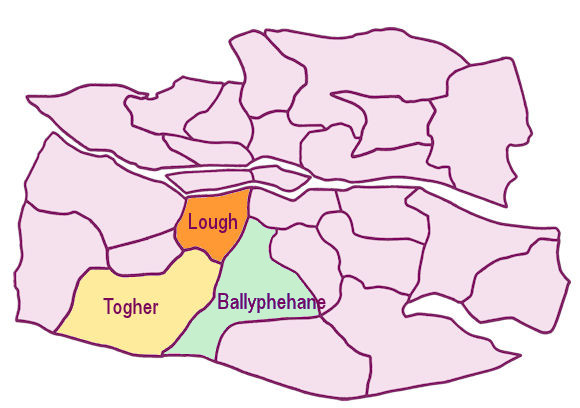Reflection
Reflection for Sunday 1st March, 2026
2nd Sunday of Lent
Listen to Him (Matt 17: 1-9)
Last Sunday we were with Jesus on the Mount of Temptation. Today we see him on the Mount of Transfiguration. It’s such a contrast of experiences, from temptation to the vision of divine glory. He took with him Peter, John and James and went up a high mountain where they could be alone.
Climbing the mountain is a struggle, but when the summit is reached it’s worth it.
One now gets a panoramic view of the winding of rivers, the meeting of roads, the outline of fields and coastline. It’s an experience that opens up the mind. The poet, William Blake, described it admirably.
“Great things happen when men and mountain meet
This is not done while jostling in the street.”
 “This is my Son, the Beloved; he enjoys my favour. Listen to him.”
“This is my Son, the Beloved; he enjoys my favour. Listen to him.”Holy Mountains
It is not surprising that in the bible, mountains are associated with divine encounters. It was on a mountain that Moses received the commandments, that Elijah experienced a mystical meeting with God, and it was the Sermon on the Mount that outlined the charter of Christian living. The three apostles were granted a tiny glimpse of divine glory, something they would never forget. Moses and Elijah appeared to them. Moses represented the Law and Elijah represented the prophets, the two sources of wisdom in the past. Peter would have stayed there forever but it wasn’t to be. Jesus told them, “Stand up, do not be afraid.” They come down to the jostling in the street of stern reality. However, memory kept the experience alive. The same three apostles witnessed the dreadful agony of Jesus in Gethsemane. Later, as pillars of the early Church, they experienced many difficult times. Peter lets us know how they tapped into this special bank of memory. “We were with him on the holy mountain” (2 Pet. 1:18). The voice from above which the apostles heard affirmed the identity of Jesus and the importance of listening to his teaching. “This is my Son, the Beloved; he enjoys my favour. Listen to him.”
Listen to him
Lent is a good time for asking ourselves who directs our lives. In the Shepherd Psalm we say, “He guides me along the right path / he is true to his name.” We need to learn how to listen to God, to listen attentively to other people and even learning how to listen to our own inner feelings. To listen with attention is the first step in loving.
Mother Teresa’s Business Card
When Saint Teresa of Kolkata became internationally known she met with many world leaders. She was handed many Business Cards with the promise of financial help if she needed cash for any project. In return, she gave her own Business Card, five short lines. “The fruit of silence is prayer: the fruit of prayer is faith: the fruit of faith is love: the fruit of love is service: and the fruit of service is peace.” Everybody seeks inner peace. It cannot be bought. It’s like trying in vain to grab hold of a butterfly. One must be still and let it land on the hand. This stillness creates the space for prayer … which develops faith … which enkindles the fire of love … which reaches out in service. The butterfly has landed!
Pray for the gift of silent listening to the Lord. In our busy, noisy world today it is difficult to listen attentively. Our attention span nowadays is only a fraction of what it was before the age of technology. People flee from silence by turning up the volume or inserting earphones. Many years ago, T.S.Eliot wrote that people have “Knowledge of speech, but not of silence/ Knowledge of words, and ignorance of the Word.” His observation is far truer today.
Gratitude is the heart of prayer
The apostles Peter, John and James remained steadfast through their dark days by remembering that day of vision when, as Peter recalled, “We were with him on the mountain.”
One of the most helpful books I ever read was Ann Voskamp’s “One Thousand Gifts” published in 1910. Her husband was a pig farmer, she had a young family, and she worked as a journalist. Yet, at the end of each day she found time to reflect and made a note of one gift of God or a blessing she received that day. It inspired me to do the same. One blessing is enough to record each day. This quiet moment of gratitude at the end of the day will greatly increase your awareness of God’s presence in your life.
One final thought. If you think you are a million miles from God, guess who moved! During Lent, find time for God. “This is my Son, the Chosen One. Listen to him”
Prayer of the day
O God, who have commanded us to listen to your beloved Son, be pleased, we pray, to nourish us inwardly by your word, so that, with spiritual sight made pure, we may rejoice to behold your glory.
Reflections
- Lent 7 - Is Easter just for children?
- Lent 6 - Why should I hope in the Church?
- Lent 5 - Is it wrong to be joyful?
- Lent 4 - Should we hope in each other?
- Lent 3 - Why do we experience suffering?
- Lent 2 - What does Baptism mean to me?
- Lent 1 - Do I feel loved?
- Day of Prayer for Survivors and Victims of Abuse 2023
- A Thiarna dean Trocaire
- Ag Críost an Síol

